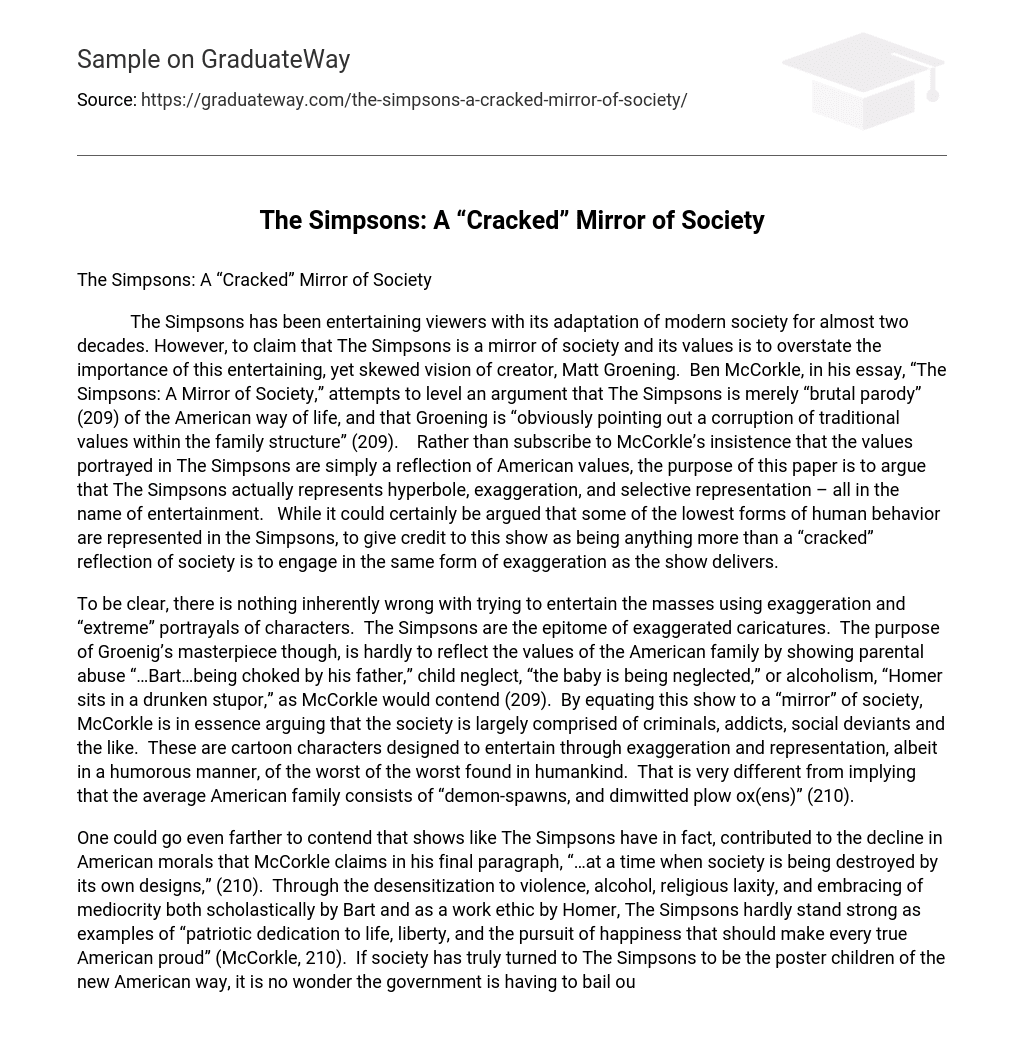The Simpsons has been entertaining viewers with its adaptation of modern society for almost two decades. However, to claim that The Simpsons is a mirror of society and its values is to overstate the importance of this entertaining, yet skewed vision of creator, Matt Groening. Ben McCorkle, in his essay, “The Simpsons: A Mirror of Society,” attempts to level an argument that The Simpsons is merely “brutal parody” (209) of the American way of life, and that Groening is “obviously pointing out a corruption of traditional values within the family structure” (209). Rather than subscribe to McCorkle’s insistence that the values portrayed in The Simpsons are simply a reflection of American values, the purpose of this paper is to argue that The Simpsons actually represents hyperbole, exaggeration, and selective representation – all in the name of entertainment. While it could certainly be argued that some of the lowest forms of human behavior are represented in the Simpsons, to give credit to this show as being anything more than a “cracked” reflection of society is to engage in the same form of exaggeration as the show delivers.
To be clear, there is nothing inherently wrong with trying to entertain the masses using exaggeration and “extreme” portrayals of characters. The Simpsons are the epitome of exaggerated caricatures. The purpose of Groenig’s masterpiece though, is hardly to reflect the values of the American family by showing parental abuse “…Bart…being choked by his father,” child neglect, “the baby is being neglected,” or alcoholism, “Homer sits in a drunken stupor,” as McCorkle would contend (209). By equating this show to a “mirror” of society, McCorkle is in essence arguing that the society is largely comprised of criminals, addicts, social deviants and the like. These are cartoon characters designed to entertain through exaggeration and representation, albeit in a humorous manner, of the worst of the worst found in humankind. That is very different from implying that the average American family consists of “demon-spawns, and dimwitted plow ox(ens)” (210).
One could go even farther to contend that shows like The Simpsons have in fact, contributed to the decline in American morals that McCorkle claims in his final paragraph, “…at a time when society is being destroyed by its own designs,” (210). Through the desensitization to violence, alcohol, religious laxity, and embracing of mediocrity both scholastically by Bart and as a work ethic by Homer, The Simpsons hardly stand strong as examples of “patriotic dedication to life, liberty, and the pursuit of happiness that should make every true American proud” (McCorkle, 210). If society has truly turned to The Simpsons to be the poster children of the new American way, it is no wonder the government is having to bail out every industry, and that the country is in the worst economic recession since the Great Depression.
Everyone needs a good laugh occasionally to lift the spirits. The Simpsons certainly can provide a politically incorrect laugh or two, and for various reasons has found a market and done well for itself as a prime-time cartoon. However, to call the animated stars of this show “heroes” (210) or to give more credibility to their affect on society other than calling it bawdy entertainment at the expense of the underclass is to overstate the importance of this piece of pop culture. While it may reflect a fraction of society, it is done so in such a fractured and fragmented manner that it cannot be given the credence McCorkle dispenses.
Works Cited
McCorkle, Ben. “The Simpsons: A Mirror of Society.” Readings for OSU Writers 209-210
The Simpsons. “Beyond Blundersome.” Prod. Matt Groening. 26 September 1999
The Simpsons. “Who Shot Mr. Burns? Part One.” Prod. Matt Groening. 21 May 1995
The Simpsons. “Who Shot Mr. Burns? Part Two.” Prod. Matt Groening. 17 September 1995





